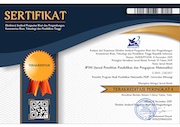Pengaruh penerapan model pembelajaran brain-based learning terhadap kemampuan pemecahan masalah matematik siswa
Abstract
This study aims to determine the ability of better problem solving of mathematics between classes that use the learning model of brain-based learning and the class using direct instruction learning model and to know the difference of mathematical problem solving ability from the category of early mathematical ability (high, medium, and low) As well as to find out the mean student self-efficacy higher between the two classes. This research is a quasi-experimental research with Post-test Only Control Group Design. The study population is all students of class VII MTs Negeri 2 Ciamis academic year 2016/2017. Selection of sample using purposive sampling technique which result is class VII D as a group that learn with a model of brain-based learning and class VIIE as a class which learn with direct instruction model. To get data result of research in the form of problem-solving ability score used an instrument in the form of description problem while to measure self-efficacy of student used questionnaire. Data analysis was performed using Mann-Whitney test, t-test and 2-way ANOVA test. The results showed: (1) the problem-solving ability of mathematics students using learning model of brain-based learning better than students using direct instruction model. (2) viewed from the ability of early mathematical (KAM) there is the difference of problem-solving ability of student mathematics learning using a model of brain-based learning by using direct instruction model. (3) there is no interaction between learning and KAM on students’ mathematical problem-solving abilities. (4) the average self-efficacy of students in the class who are learning with the higher brain-based learning model than those using the direct instruction model and both are positive.
Full Text:
view PDFReferences
Arikunto, S. (2009). Manajemen Penelitian. Jakarta: Rineka Cipta.
Bandura, A.(1997). Self-Efficacy: The exercise of control. New York: W.H. Freeman and company.
Hendriana, H. dan Soemarmo, U. (2014). Penilaian Pembelajaran Matematika. Bandung: Refika Aditama.
Jensen, E. (2008). Brain-Based Learning Pembelajaran Berbasis Kemampuan Otak. Celeban Timur: Pustaka Pelajar.
Lestari, K.E. dan Yudhanegara, M.R (2015). Penelitian Pendidikan Matematika. Bandung: Refika Aditama.
Mustiada, dkk. (2014). Pengaruh Model Pembelajaran BBL (Brain Based Learning) Bermuatan Karakter Terhadap Hasil Belajar IPA. Jurnal Mimbar PGSD Universitas Pendidikan Ganesha (Vol: 2 No: 1).
Nahdi, D.S. (2015). Meningkatkan Kemampuan Berpikir Kritis dan Penalaran Matematis Siswa Melalui Model Brain-Based Learning. Jurnal Cakrawala Pendas. Vol. 1. pp. 13-22.
Polya, George. (1957). How to Solve It: A New Aspect of Mathematical Method (Second Ed.). USA: Princeton University Press, Princeton New Jersey.
Posamentier, A.S. dan Krulik, S. (2009). Problem solving in mathematics, grades 3–6: powerful strategies to deepen understanding. USA: acid-free paper. 58
Sukoco, H. dan Mahmudi, A. (2016). Pengaruh Pendekatan Brain Based Learning terhadap Kemampuan Komunikasi Matematis dan Self-Efficacy Siswa SMA. PHYTAGORAS: Jurnal Pendidikan Matematika. Vol. 11. pp. 11-24.
DOI: https://doi.org/10.37058/jp3m.v3i2.259
Refbacks
- There are currently no refbacks.
©2017 JP3M (Jurnal Penelitian Pendidikan dan Pengajaran Matematika)
Program Studi Pendidikan Matematika
Fakultas Keguruan dan Ilmu PendidikanÂ
Universitas Siliwangi
Jl. Siliwangi No. 24 Kota Tasikmalaya - 46115
email: jp3m@unsil.ac.id
e-ISSN: 2581-2807 ; p-ISSN: 2460-8599

This work is licensed under a Creative Commons Attribution-NonCommercial-ShareAlike 4.0 International License.
StatCounter:
Detail


